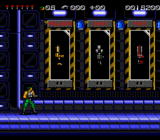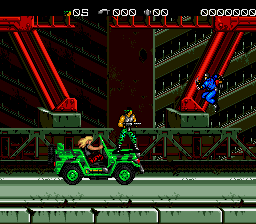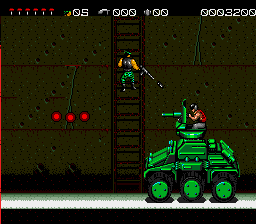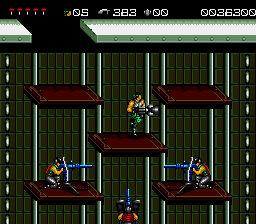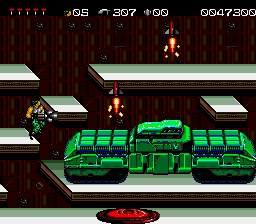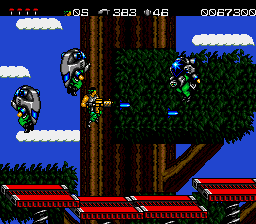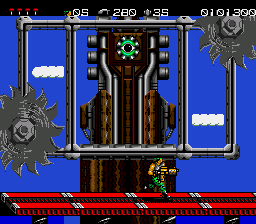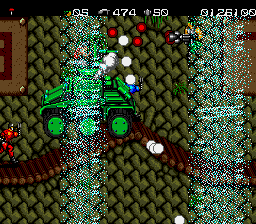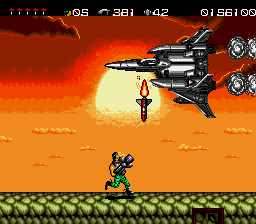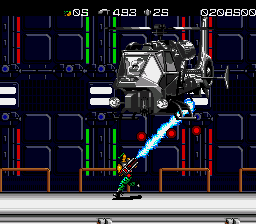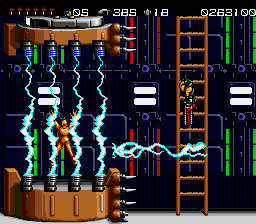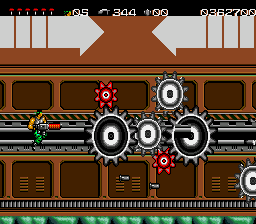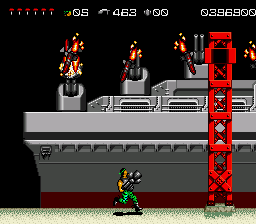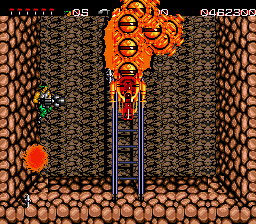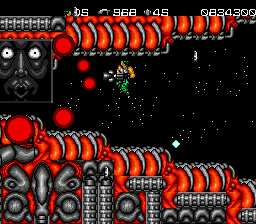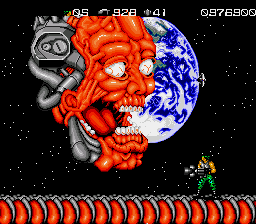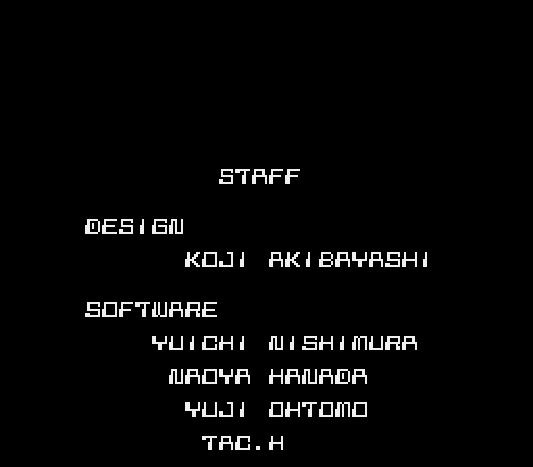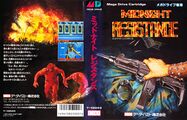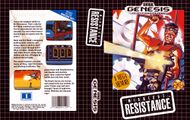Midnight Resistance
From Sega Retro
| Midnight Resistance | ||||||||||||||||||||
|---|---|---|---|---|---|---|---|---|---|---|---|---|---|---|---|---|---|---|---|---|
| System(s): Sega Mega Drive | ||||||||||||||||||||
| Publisher: Data East (JP), Sega of America (US) | ||||||||||||||||||||
| Developer: ISCO, Opera House | ||||||||||||||||||||
| Licensor: G-Mode | ||||||||||||||||||||
| Original system(s): Arcade boards | ||||||||||||||||||||
| Developer(s) of original games: Data East | ||||||||||||||||||||
| Genre: Action[1] | ||||||||||||||||||||
| Number of players: 1 | ||||||||||||||||||||
| ||||||||||||||||||||
|
Midnight Resistance (ミッドナイトレジスタンス) is a run-and-gun action game for the Sega Mega Drive, published by Data East in Japan and by Sega in North America. It is a conversion of a Data East arcade game.
Contents
Story
Johnny Ford (Daichi Madoka in the Japanese version) is a member of an operative group that shuts down drug cartels in South America. His father, Malcolm Ford, is developing a serum that could help people break their addictions to narcotics.
After completing his last mission, Johnny returned home to find it in shambles. He finds a note saying that the cartel leader King Crimson has kidnapped his entire family. Since the government is unable to help Johnny, he sets off on his own to rescue his family and destroy King Crimson's empire of evil for good.
Gameplay
The game is a run-and-gun. Though the original arcade version allowed up to two players simultaneously, the Mega Drive version is strictly single player. The player controls a commando armed with an automatic weapon. He walks with ![]() and
and ![]() and jumps with
and jumps with ![]() . He lies down with
. He lies down with ![]() and crawls with
and crawls with ![]() and
and ![]() . He starts firing his weapon with
. He starts firing his weapon with ![]() , which continuously fires until the player presses
, which continuously fires until the player presses ![]() again to cease fire. He climbs ladders with
again to cease fire. He climbs ladders with ![]() and
and ![]() . His weapon can be aimed in eight directions (including while prone or jumping).
. His weapon can be aimed in eight directions (including while prone or jumping).
Since the arcade game had a special rotating joystick for independent control of movement and firing, which the Mega Drive lacks, there are two primary control schemes to choose from:
- Control A uses the D-Pad to aim the weapon in any direction. Since the D-Pad is also used for moving, the player can lock the weapon in position by holding
 , allowing the player to move and fire in separate directions.
, allowing the player to move and fire in separate directions. - Control B shoots continually in a particular direction regardless of the direction that the D-Pad is held in. The player rotates the firing direction by holding
 . It has three variants. With the Control B1 scheme, the direction of the weapon's rotation alternates between clockwise and counterclockwise. With Control B2, the weapon always rotates clockwise. With Control B3, the weapon always rotates counterclockwise. These schemes offer more efficient use of the weapon but are considerably trickier to control and require more practice.
. It has three variants. With the Control B1 scheme, the direction of the weapon's rotation alternates between clockwise and counterclockwise. With Control B2, the weapon always rotates clockwise. With Control B3, the weapon always rotates counterclockwise. These schemes offer more efficient use of the weapon but are considerably trickier to control and require more practice.
Fallen enemies drop keys, which can be collected and exchanged in the supply room at the end of each stage for extra weapons and power-ups. These weapons have limited ammunition, though the default gun is unlimited. If a weapon runs out of ammo, the player reverts to the starting machine gun. There is also a selection of secondary weapons, called backpack weapons, that are used by pressing ![]() while firing. These weapons do area damage and likewise have limited uses. The player's weapons, ammo, and keys are retained from stage to stage.
while firing. These weapons do area damage and likewise have limited uses. The player's weapons, ammo, and keys are retained from stage to stage.
The commando dies if he touches an enemy or a projectile, but he is revived immediately if the player has lives remaining. The commando drops his weapon and keys when he loses a life, but they can be collected after reviving. The game ends if the player runs out of lives, but it can be continued from the start of the stage as long as the player has continues remaining.
Items
| Key | |
|---|---|
| Keys are dropped by slain enemies and can be exchanged after each stage for weapons and other items. | |
| Bullet | |
| Gives the player an extra 500 rounds of the current weapon (up to a maximum of 999). Costs 2 keys. | |
| Barrier | |
| Encircles the commando with a protective barrier that harms enemies that touch it. Costs 2 keys. | |
| Super Charger | |
| Empowers the current weapon. Costs 3 keys. | |
| 1-Up | |
| Gives the player an extra life. Costs 2 keys. |
Weapons
Weapons come with 500 rounds.
| Full Auto | |
|---|---|
| Fast-firing shots. Costs 2 keys. | |
| 3-Way | |
| A conical spreadshot. Costs 2 keys. | |
| Fire | |
| A stream of fire that stretches to the end of the screen. Costs 2 keys. | |
| Shot Gun | |
| Slow-firing but powerful shots that cause enemies to explode. Costs 3 keys. |
Backpack Weapons
Backpack weapons come with 50 uses.
| Nitro | |
|---|---|
| A radial burst of fireballs. Costs 3 keys. | |
| Shower | |
| A shower of projectiles that fall from the sky. Costs 3 keys. | |
| Homing Missiles | |
| A flurry of missiles that seek out targets. Costs 3 keys. |
Stages
| Stage 1 | |
|---|---|
| Stage 2 | |
| Stage 3 | |
| Stage 4 | |
| Stage 5 | |
| Stage 6 | |
| Stage 7 | |
| Stage 8 | |
| The player can rescue family members from the supply room at the end of this stage in exchange for keys. The ending varies depending on how many family members the player has rescued. | |
| Stage 9 | |
Versions
The Mega Drive version of Midnight Resistance is a relatively close conversion of the arcade game, albeit one that lacks any two-player options. Backgrounds are less detailed on the Mega Drive, animations are sometimes simplified and much of the game adopts an entirely different (and much darker) colour palette for unknown reasons. Digitised speech is absent from the Sega version (although very little of it is heard in the arcade original), and while the level design is more-or-less the same, there are often fewer enemies on-screen presumably to help manage the frame rate. Special effects are also often simplified for similar reasons.
Despite this, both the arcade and Mega Drive versions exhibit slowdown in busy scenes, although unusually for the era, the Sega conversion often performs better than its arcade counterpart.
Production credits
- Design: Koji Akibayashi
- Software: Yuichi Nishimura, Naoya Hanada, Yuji Ohtomo, Tac.H
- Hardware: Keiichi Yoshida, Hiroyuki Iwabe, Shingo Mitsui
- Graphic: Tomoo Adachi, Kazumi Minagawa, Fujimi Oonishi, Yoshinari Kaihoh
- Sound: Azusa Hara (Ahsa), Hiroaki Yoshida (Maro), Fuse, Tatsuya Kiuchi (Kiwchi), Hitomi Komatsu (Hitomi)
- Thanks to: Shinji Noda, Masahiko Ujita, Nobuyuki Kawaguchi, Shinya Doi, Yoshiaki Honda, Shunichi E
- Producer: Mizuho Yosida
- Director: Yukihiro Kawai, Shigeki Saka
- Planner: Takashi Matsumoto, Hiroyuki Fujiwara, Satoru Miki
- Sub Planner: Takehiko Ishiro
- PR: Satoshi Takeuchi, Kouichi Saitoh
- Sales: Kazushi Takekoshi
- Sound: Hitoshi Sakimoto (YmoH.S), Shougo Sakai (Shyougo Sakai)
- Thanks to: Makoto Watanabe, Mitsuo Iwao, Masahiko Nakamura
Digital manuals
Magazine articles
- Main article: Midnight Resistance/Magazine articles.
Artwork
Physical scans
| ExpandSega Retro Average |
|---|
| 71 | |
|---|---|
| Based on 29 reviews | |
Technical information
- Main article: Midnight Resistance/Technical information.
References
- ↑ Jump up to: 1.0 1.1 https://sega.jp/history/hard/megadrive/software_l.html (Wayback Machine: 2020-07-02 23:21)
- ↑ Jump up to: 2.0 2.1 Electronic Gaming Monthly, "June 1991" (US; 1991-xx-xx), page 22
- ↑ Jump up to: 3.0 3.1 GamePro, "November 1991" (US; 1991-xx-xx), page 55
- ↑ https://www.amusement-center.com/project/egg/game/?product_id=856
- ↑ File:Midnight Resistance MD credits.pdf
- ↑ https://www.originalvideogameart.com/video-game-illustrators/bud-thon-b-1938-r260/
- ↑ 1700 igr dlya Sega, "" (RU; 2001-xx-xx), page 129
- ↑ ACE, "June 1991" (UK; 1991-05-08), page 73
- ↑ Beep! MegaDrive, "April 1991" (JP; 1991-03-08), page 29
- ↑ Cool Gamer, "9" (RU; 2002-10-13), page 125
- ↑ Computer & Video Games, "June 1991" (UK; 1991-05-11), page 44
- ↑ Mean Machines: The Essential Sega Guide, "" (UK; 1993-11-18), page 71
- ↑ Famitsu, "" (JP; 1991-0x-xx), page 1
- ↑ GameFan, "Volume 1, Issue 7: June 1993" (US; 1993-xx-xx), page 17
- ↑ Games-X, "24th May 1991" (UK; 1991-05-17), page 36
- ↑ Game Informer, "September 2001" (US; 2001-0x-xx), page 114
- ↑ Hippon Super, "April 1991" (JP; 1991-03-04), page 42
- ↑ Joystick, "Mai 1991" (FR; 1991-0x-xx), page 138
- ↑ Sega Mega Drive Advanced Gaming, "January 1993" (UK; 199x-xx-xx), page 93
- ↑ Mega Drive Fan, "June 1991" (JP; 1991-05-08), page 91
- ↑ Mega Play, "May/June 1991" (US; 1991-0x-xx), page 43
- ↑ MegaTech, "Xmas 1991" (UK; 1991-12-06), page 79
- ↑ Mean Machines, "May 1991" (UK; 1991-05-01), page 22
- ↑ Mean Machines Sega, "October 1992" (UK; 1992-09-xx), page 140
- ↑ Power Play, "7/91" (DE; 1991-06-12), page 124
- ↑ Raze, "September 1991" (UK; 1991-07-25), page 30
- ↑ Sega Power, "October 1991" (UK; 1991-09-05), page 54
- ↑ Sega Pro, "April 1993" (UK; 1993-03-11), page 66
- ↑ Sega Saturn Magazine, "September 1995" (JP; 1995-08-08), page 85
- ↑ Tilt, "Juin 1991" (FR; 1991-0x-xx), page 75
- ↑ Tricks 16 bit, "Tricks Sega Gold 800 igr" (RU; 1998-03-20), page 19
- ↑ User, "Noémvrios 1991" (GR; 1991-1x-xx), page 92
- ↑ Video Games, "2/91" (DE; 1991-06-07), page 89
| CollapseMidnight Resistance | |
|---|---|
|
Main page | Comparisons | Hidden content | Magazine articles | Video coverage | Reception | Region coding | Technical information | Bootlegs | |

